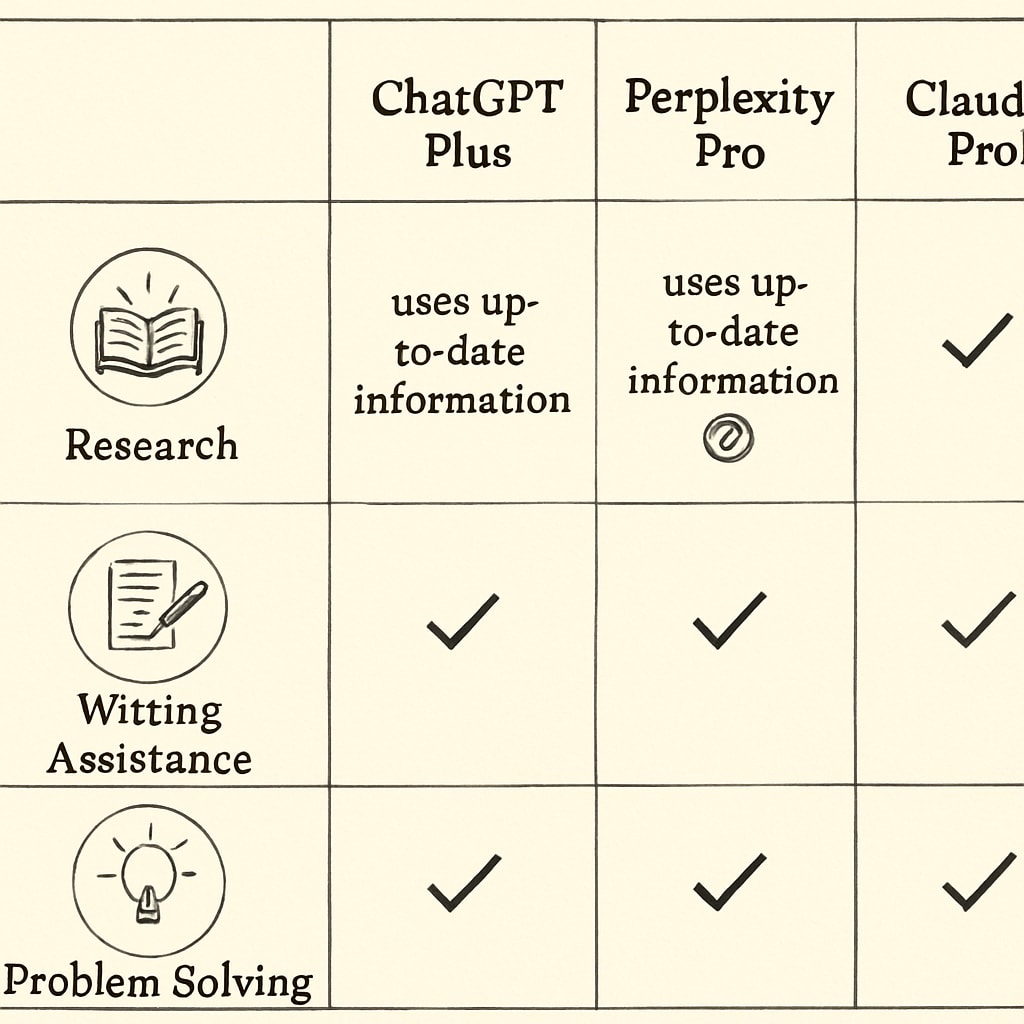In the age of rapid technological advancement, AI subscription services like ChatGPT Plus, Perplexity Pro, and Claude Pro are redefining how students approach their university studies. These learning tools serve as academic assistants, offering support in research, essay writing, coding, and more. But how do these tools compare in terms of practicality and effectiveness? This article delves into a real-life scenario where a university student discovers their roommate reallocating food budget funds for an AI subscription—and explores the broader utility of these services in academic settings.
Comparing AI Subscription Services for Academic Tasks
AI subscription services have distinct features tailored to various academic needs. Here’s a breakdown of how ChatGPT Plus, Perplexity Pro, and Claude Pro perform when applied to university-level studies:
- ChatGPT Plus: Priced at $20/month, this service offers enhanced performance, quicker responses, and access to GPT-4. It’s especially effective for generating essay drafts, brainstorming ideas, and understanding complex concepts. However, its responses can sometimes lack depth for niche topics.
- Perplexity Pro: Known for its capability to integrate real-time web searches, Perplexity Pro excels in research-heavy tasks. While it comes at a higher cost, this service is ideal for disciplines like sociology or political science, where current data and sources are critical.
- Claude Pro: Built by Anthropic, Claude Pro offers a more conversational and human-like experience. It is particularly helpful for coding tasks, providing detailed explanations and debugging assistance. Despite its strengths, it may fall short in generating lengthy, structured academic essays.

Maximizing the Value of AI Tools for University Learning
To fully leverage AI subscription services, students should adopt specific strategies that complement their learning styles. Here are some tips to get the most out of these tools:
- Define Your Goals: Are you looking for help with coding, essay writing, or data analysis? Choose the tool that aligns with your academic objectives.
- Combine Multiple Services: Use ChatGPT Plus for generating ideas, Perplexity Pro for sourcing references, and Claude Pro for coding assignments. Each tool has unique strengths that can complement the others.
- Cross-Check AI Outputs: Always review and verify the information provided by AI tools. Cross-referencing with academic sources ensures accuracy and reliability.
- Learn Through Interaction: Instead of passively receiving answers, engage in a dialogue with the AI. Ask follow-up questions to deepen your understanding of the topic.
By integrating these strategies, students can transform AI tools into powerful academic assistants.

The Ethical Implications of AI in Academia
While AI tools offer significant academic advantages, they also raise ethical questions. For example, using AI to produce entire essays may cross the line into academic dishonesty. To navigate these concerns, students should use AI as a supplement to their efforts, not as a replacement. Universities are increasingly developing guidelines to ensure ethical AI use, emphasizing transparency and proper citation of AI-generated content.
Furthermore, students should remain mindful of data privacy when using AI tools. Reading the privacy policies and understanding how data is stored can help mitigate risks. For a deeper dive into ethical considerations, refer to resources like the Ethics of Artificial Intelligence on Wikipedia.
Conclusion: Choosing the Right AI Tool
AI subscription services like ChatGPT Plus, Perplexity Pro, and Claude Pro are revolutionizing the academic landscape. By understanding their unique strengths, students can select the most suitable tool for their needs. Whether it’s generating ideas, conducting research, or debugging code, these AI tools have the potential to significantly enhance learning outcomes.
However, success depends on how these tools are utilized. By adopting ethical practices, cross-checking information, and actively engaging with AI, students can unlock their full potential as academic assistants. As a result, these subscription services may prove to be just as essential as textbooks in the modern university experience.
Readability guidance: Ensure clear and concise writing by using short paragraphs and lists. Incorporate transitional phrases to improve flow and limit the use of passive voice and overly complex sentences.


